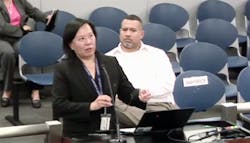Chicago board approves new rules for police role in district schools
The Chicago school board has approved new ground rules for police officers working in schools
The Chicago Sun-Times reports that the intergovernmental agreement with the city police department spells out which scenarios should — and which should not — involve Chicago police officers stationed in schools, how the officers are selected for different schools, and how a school can remove its officers.
The new rules came after 19 community meetings held in recent months.
The board voter 5 to 1 to approve the plan. Hours earlier a dozen students stood outside board headquarters downtown and urged district officials to keep police out of schools.
“The truth is, having police officers in school doesn’t necessarily mean being safe,” says Brenda Leyva, the student representative on the local school council at Roosevelt High School.
Among the many concerns about having officers in schools is that police are contributing to the school-to-prison pipeline that could result in students, disproportionately students of color, ending up with criminal records for infractions that should be resolved through routine school discipline.
The district’s head of safety and security, Jadine Chou, told the school board that some of the district’s reforms to its disciplinary system have worked. She pointed to improvements between 2012-13 and 2017-18, when there was a 77% drop in expulsions and out-of-school suspensions of African-American boys and a 43% reduction in incidents involving African-Americans where Chicago police were called.
Chou said that going forward, police officers should be involved in a school incident only when a crime has been committed, or when there’s a serious or imminent threat, usually involving a weapon.
The board member who voted against the agreement with the police department, University of Illinois at Chicago history professor Elizabeth Todd-Breland, says research shows cops in schools can have a negative influence on some students.
“The research is overwhelming that having police presence in schools in fact contributes and is the entry point, often, to the school-to-prison pipeline — and particularly for black students, Latinx students and our students with disabilities," Todd-Breland said. "It’s both academic research, but also juvenile court judges say this.”
About the Author
Mike Kennedy
Senior Editor
Mike Kennedy, senior editor, has written for AS&U on a wide range of educational issues since 1999.
